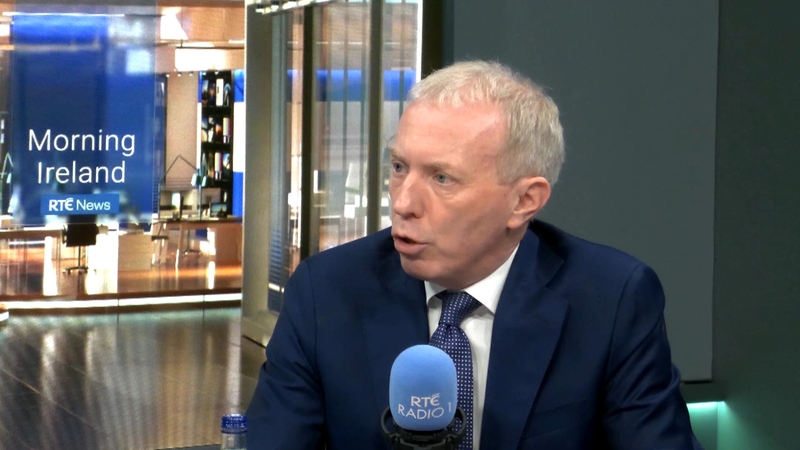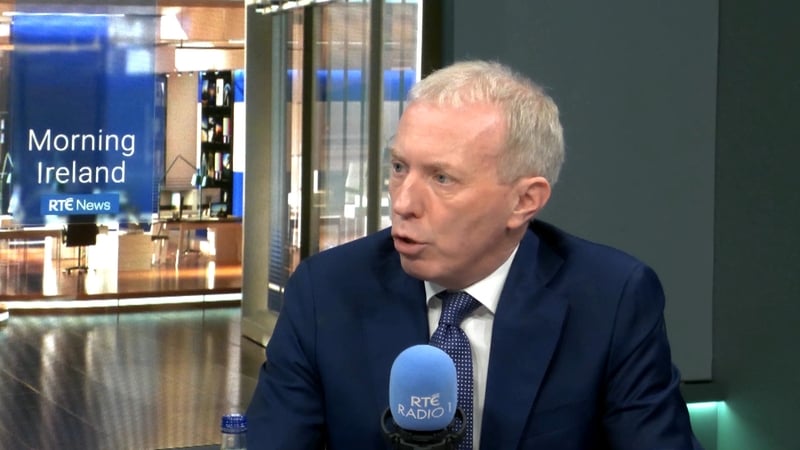Updated / Saturday, 5 Apr 2025 14:38

A scheme to help businesses affected by US tariffs cannot be “one-size-fits-all”, Minister of State Timmy Dooley has said.
Mr Dooley said such a scheme would have to be “tailored for different sectors”, adding “it’s not like taking a scheme from the shelf here and presenting it to the public at large”.
Speaking on Saturday with Colm Ó Mongáin, he said the Government “will stand by the workforce of those that are affected and the companies affected”.
“It’s about assisting companies that are going to be most dramatically affected in focusing on new markets and in the first instance Enterprise Ireland and other state agencies are very well versed in assisting companies through that difficult period,” he said.
“I have every confidence in the state agencies to work with the companies and the sectors that are most affected,” Mr Dooley added.
The Minister for State at the Department of Agriculture, Food and the Marine said employers and unions gathered at Government Buildings yesterday to meet the Taoiseach, Tánaiste and key ministers to discuss the matter.
“It’s very clear, it doesn’t take an expert to recognise that there’s significant funds available to address the crisis that may emerge here and to try and smoothen the impact on companies and to work towards finding new markets and working through that,” he said.

Mr Dooley said there is hope the European Union can enter “a phase of discussion” with the US over the imposition of tariffs.
He said there is a “need to focus” from the Government’s perspective to work with European partners to “not overreact and get into a negotiation phase”.
Sinn Féin TD Louise O’Reilly said the Government should ensure “that there is a very early assessment of the impact” of US tariffs.
Read more:
US must ‘stop using tariffs as a weapon’, says China
Tariff ‘uncertainty’ for NI firm with goods on way to US
Jaguar Land Rover ‘pause’ US shipments in wake of tariffs
Europe poised between reflection and attack on Trump tariffs
She said is because “we don’t have is a massive amount of detail” about the levies.
“We need to ensure that we do the assessment on where the impact is going to fall and where it’s going to fall hardest,” she said.
Speaking on the same programme, Ms O’Reilly said there is a need for “contingency planning” to make sure that the supports needed for industries and workers “are ready and that they’re capable of being deployed quickly because this is a very fast moving situation”.

She added the Government also need to “start looking at how we’re going to de-risk our economy and mitigate the impact of the tariffs”.
Ms O’Reilly added the supports “that will be necessary” will be “a combination of domestic supports from the government here and also from the European Union”.
People Before Profit-Solidarity’s Paul Murphy said “a proper short time working scheme like they have in Germany” is needed to support those impacted.
This, he said, “doesn’t just mean that you can get the dole for the days that you’re not working, but enables you to get a reasonable percentage of your current income subsidised by the State”.
Also on the programme, Mr Murphy said energy credits will be needed again “as an extremely minimal measure” to ensure that workers aren’t going to be hit by “a renewed cost of living crisis as inflation ramps up again” due to the tariffs.
“Ordinary workers must not be made to pay the price for what is coming or what is very likely to be coming,” he added.




